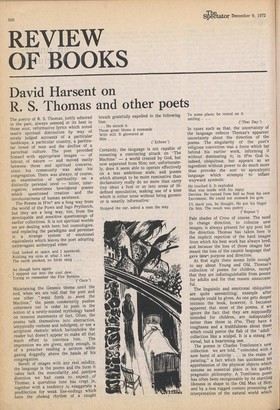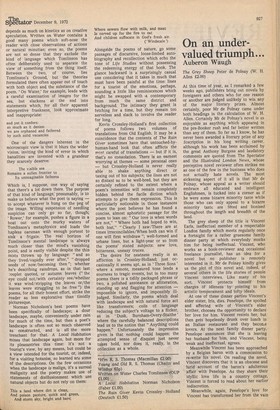David Harsent on R. S. Thomas and other poets
The poetry of R. S. Thomas, justly admired in the past, always seemed at its best in those sour, reformative lyrics which noted man's spiritual diminution by way of nicely judged accounts of a particular landscape, a particular country, a particular breed of men and the decline of a parochial culture. The poet provided himself with appropriate images — of labour, of nature — and moved easily between those and spiritual concerns, since his community was also his congregation. There was always, of course, an examination of spirituality on a distinctly personal level — bitter, interrogative, sometimes bewildered poems which questioned creation and the involuntariness of human existence.
The Poems in H'm* are a long way from the world of the Puws and Iago Prytherch, but they are a long way, too, from the developable and sensitive questionings of earlier collections. It is not spiritual worlds we are dealing with here, but cosmologies, and replacing the paradigms and personae is a strange system of emotional equivalents which leaves the poet adopting extravagant archetypal roles:
God looked at space and I appeared, Rubbing my eyes at what I saw.
The earth smoked, no birds sang . . .
As though born again I stepped out into the cool dew, Trying to remember the Fire Sermon . . .
'(' Once ') Maintaining the Genesis theme until the end, when we are told that the poet and one other "wit forth to meet the Machine," the poem consistently pushes coherence out in order to push in the notion of a newly-minted mythology based on tenuous statements of fact. Often, the poems talk themselves into abstraction, untypically verbose and indulgent, or use a scriptural rhetoric which buttonholes the reader but doesn't appear to make all that much effort to convince him. The impression we are given, aptly enough, is of a preacher reading a sermon while gazing doggedly above the heads of his congregation.
Bereft of images with any real solidity, the language in the poems and the form it takes lack the muscularity and positive direction we had come to expect of Thomas; a querulous tone has crept in, together with a tendency to exaggerate a predilection for weak line-endings which have the choked rhythm of a caught breath gratefully expelled in the following line:
. . . He struck it
Those great blows it resounds With still. It glowered at Him . . . (' Echoes ') Certainly, the language is not capable of mounting a convincing attack on 'The Machine' — a world created by God, but now separated from Him; nor, unfortunately, does it seem able to .operate effectively on a less ambitious scale, and poems which attempt to be more ruminative than declamatory really do no more than carry tiny ideas a foot or so into areas of illdefined speculation, making use of a tone which is either terse without being gnomic or is wearily informative: Stopped the car, asked a man the way To some place; he rested on it smiling . . .
(` That Day ')
In cases such as that, the uncertainty of the language reflects Thomas's apparent uncertainty about the direction of the poems. The singularity of the poet's religious conviction was a force which lay behind his earlier work, informing it without dominating it; in H'm God is, indeed, ubiquitous, but appears as an ingredient without power to do much more than provoke the sort to apocalyptic language which attempts to inflate wayward symbols:
He touched it. It exploded.
Man was inside with his many Devices. He turned from hinf as from his own Excrement. He could not stomach his grin.
I'll Mark' you, he thought. He put his finger On him. The result was poetry . . .
(' Repeat ')
Pale shades of Crow of course. The need to change direction, to colonise new images, is always present for any poet but the direction Thomas has taken here is the implicit rejection of the hard images from which his best work has always bred, and because the loss of those images has meant the loss of the caustic language that gave thqr,.. purpose and direction.
At first sight there seems little enough to say about Young and Old, Thomas's collection of poems for children, except that they are indistinguishable from poems for adults and for that reason unsuccessful.
The linguistic and emotional obliquities are quite unremitting; example after example could be given. As one gets deeper intointo the book, however, it becomes apparent that most of the poems, if we ignore the fact that they are supposedly intended for children, are indisputably better than those in PI'm. They have a toughness and a truthfulness about them which could pierce the flab of the ' adult ' collection like a scalpel. It is a strang reversal, but a heartening one.
The poems in Charles Tomlinson's new collection we are told, "coincided with a new burst of activity . . . in the realm of painting," a fact which has quickened his apprehension of the physical objects which assume an essential place in his quirky, pragmatic philosophy. A Tomlinson poem
has often been recognisable by its startling likeness in shape to the Old Man of Hey, and by a less rugged content presenting an interpretation of the natural world which depends as much on kinetics as on creative speculation. Written on Water contains a good many poems which soft-nose the reader with close observations of actions or natural minutiae; even so, the poems are not so dense that they exclude the kind of language which Tomlinson has often deliberately used to separate the view of something Nom the thing itself. Between the two, of course. lies Tomlinson's Ground, but the theories formulated there often appear out of touch with both object and the substance of the poem. On Water,' for example, leads with a careful examination of images for the sea, but slackens at the end into statements which, for all their apparent interpretive frankness, look approximate and inappropriate:
and yet it confers: as much as it denies: we are orphaned and fathered by such solid vacancies One of the dangers inherent in the microscopic view is that it blurs the wider vision, inviting the kind of error in which banalities are invested with a grandeur they scarcely deserve: The visible sea Remains a sullen frontier to Its unimaginable fathoms Which is, I suppose, one way of saying that there's a lot down there. The purpose of that kind of language; presumably, is to make us believe what the poet is saying — to accept whatever is hung on the peg of the image. Willing suspension of needling suspicion can only go so far, though; Rower,' for example, pushes a figure in a boat out onto the murky waters of Tomlinson's metaphysics and loads the hapless oarsman with enough portent to sink a frigate. The real horizon of Tomlinson's mental landscape is always much closer than the mind's vanishing point, and is easily visible despite the thin mists thrown up by language: "and so they lived/vapidly ever after," "dropped seeds of now/becoming then "; whether he's describing raindrops, as in that last c.ouplet quoted, or autumn leaves (" the eye could not/with certainty see/whether it was wind/stripping the leaves or/the leaves were struggling to be free ") the poems, for all their honest effort, strike the reader as less explorative than timidly picturesque.
Norman Nicholson's best poems have been specifically of landscape; a dour landscape, maybe, conveniently under rain for much of the time, but then a poet's landscape is often not so much observed as constructed, and is all the more trenchant for that. A Local Habitation mines that landscape again, but more for its pleasantries this time: it's not a tourist's view, by any means, but could be a view intended for the tourist, or, indeed, for a visiting botanist, so learned are some of the descriptions. On the few occasions when the landscape is malign, it's a surreal malignity and the poetry makes use of statements of disillusionment which use natural objects but do not rely on them:
This a land where dirt is clean, And poison pasture, quick and green, And storm sky, bright and bare; Where sewers flow with milk, and meat Is carved up for the fire to eat And children suffocate in God's fresh air.
(' Windscale ')
Alongside the poems of nature, go some passages of discursive, loose-limbed autobiography and recollection which echo the tone of Life Studies without possessing the redeeming energy of that book. The glance backward is a surprisingly casual one considering that it takes in much that must have been painful at the time: lines for a tourist of the emotions, perhaps, sounding a little like reminiscences which might be swapped with -a contemporary from much the same district and background. The intimacy they grant is fetching for a time, but they remain too nerveless and slack to involve the reader for long.
Kevin Crossley-Holland's first collection of poems follows two volumes of translations from Old English. It may be a coincidence that the contents of The Rain Giver sometimes have that untouched-byhuman-hand look that often afflicts the roost careful of translations — but if it is, that's no consolation. There is an earnest worrying at themes — some personal ones — but Crossley-Holland is never really able to shake anything direct or taxing out of his subjects; the lines are not so distant as to be well-bred, but they are certainly refined to the extent where a poem's intensities will remain completely hidden behind the facile diction which attempts to give them expression. This is particularly noticeable in those instances where the poet believes he has found a concise, almost aphoristic passage for the poem to lean on: "Our love is when words are not," "Where both had hoped to win, both lost," "Clearly I saw/There are at times irreconcilables/When both can win if one will first withdraw "; well-formed and urbane lines, but a light-year or so from the poems' stated subjects: new love, bitterness, uneasy truces.
The desire for neatness really is an affliction in Crossley-Holland; just occasionally it seems apt, as in 'Three Sons' where a remote, measured tone lends a sourness to tragic events, but in too many poems there is a tidily packaged phrase or two, a polished assonance or alliteration, standing up and flagging for attention — impossible to ignore, and impossibly illjudged. Similarly, the poems which deal with landscape and with natural force act like transformers; coils of language reducing the subject's voltage to a flicker, as in 'Dusk, Burnham-Overy-Staithe ' where the carefully balanced descriptions lead us to the notion that "Anything could happen." Unfortunately the impression given is that nothing could happen: the attempted sense of disquiet just never takes hold, nor does it, really, in the collection as a whole.











































 Previous page
Previous page